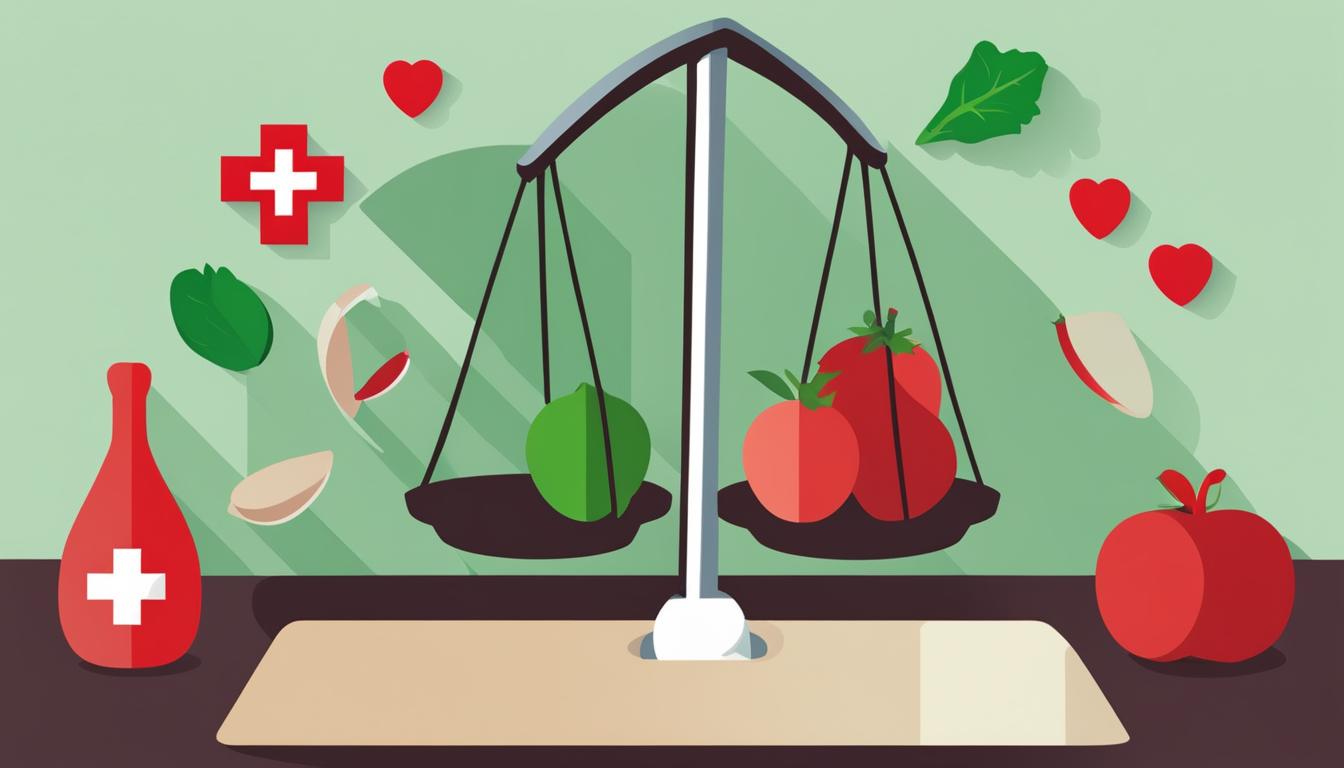The slow carb diet has gained popularity as a low-carb, high-protein weight loss and health diet. It was popularized by Tim Ferriss, author of “The 4-Hour Body.” This diet focuses on eating four slow carb meals per day for six days a week, with one cheat day. The key principle of the slow carb diet is the elimination of white carbs and the emphasis on slow-acting carbs like legumes and non-starchy vegetables. In this comprehensive guide, we will provide you with a detailed slow carb diet food list, including proteins, legumes, vegetables, healthy fats, and spices.
- The slow carb diet is a low-carb, high-protein diet that focuses on slow-acting carbs.
- It involves eating four slow carb meals per day for six days a week, with one cheat day.
- The diet emphasizes the elimination of white carbs and the consumption of legumes and non-starchy vegetables.
- Proteins, legumes, vegetables, healthy fats, and spices are included in the slow carb food list.
- The slow carb diet can support weight loss and improve overall health when combined with a calorie deficit.
What Is the Slow Carb Diet?
The slow carb diet, popularized by Tim Ferriss in his book “The 4-Hour Body,” is a low-carb, high-protein eating plan that focuses on slow-acting carbs rather than eliminating them altogether. Unlike other low-carb diets, the slow carb diet allows for the consumption of specific carbohydrates that have a slower impact on blood sugar levels.
On the slow carb diet, individuals are encouraged to eat four slow carb meals per day for six days a week, with one cheat day included. The diet revolves around avoiding white carbs, such as bread, pasta, and rice, and instead emphasizes nutrient-dense, satiating foods.

Tim Ferriss’s slow carb diet gained popularity due to its simplicity and effectiveness in promoting weight loss and overall health. By focusing on slow-acting carbs and high-quality proteins, the diet aims to stabilize blood sugar levels, improve satiety, and support sustainable weight loss.
“The slow carb diet allows for a more flexible approach to low-carb eating, making it easier to maintain in the long run while still achieving desired weight loss goals.” – Tim Ferriss
Unlike other low-carb diets that often restrict all carbohydrates, the slow carb diet provides a balanced approach to nutrient intake. It encourages the consumption of slow-acting carbs found in legumes, such as lentils and black beans, as well as non-starchy vegetables like spinach and broccoli.
The slow carb diet is designed to provide sustainable results by eliminating processed and refined carbohydrates, which can lead to blood sugar spikes and crashes. Instead, it focuses on whole foods that are rich in nutrients and promote satiety.
How to Follow the Slow Carb Diet
Following the slow carb diet is simple and straightforward. By making conscious choices about the food you consume, you can maximize the benefits of this diet plan. Here is a step-by-step guide to help you get started:
1. Plan Your Meals
To ensure success on the slow carb diet, it’s essential to plan your meals in advance. This will help you stay on track and avoid making impulsive food choices. Create a slow carb meal plan for the week, including all four meals each day.
2. Stick to the Slow Carb Food List
The slow carb food list is your guide to choosing the right ingredients for your meals. Include proteins like lean meats, eggs, and tofu. Legumes such as lentils, black beans, and chickpeas are also recommended. Non-starchy vegetables like spinach, broccoli, and peppers are great options. Don’t forget to add healthy fats like avocado and olive oil to your meals. Lastly, use spices and herbs to enhance the flavor of your slow carb meals.
3. Eliminate White Carbs and Sugary Beverages
To fully embrace the slow carb diet, it’s important to eliminate white carbs such as bread, pasta, and rice. Replace them with slow-acting carbohydrates from legumes and vegetables. Additionally, cut out sugary beverages and opt for unsweetened options like water, herbal tea, and black coffee.

4. Embrace Meal Repetition
One of the key aspects of the slow carb diet is embracing meal repetition. By eating the same meals every day, you simplify meal prep and decision-making. It takes away the guesswork and makes it easier to stick to the plan. Consider preparing your meals in batches, so you have ready-to-eat options throughout the week.
5. Cheat Day
Every slow carb diet follower looks forward to the cheat day. This is a day where you can indulge in your favorite foods that are not allowed during the week. It not only provides a mental break but also helps prevent metabolic slowdown. On this day, you can enjoy fruits and other restricted foods guilt-free.
6. Hydration and Beverages
Staying hydrated is crucial for overall health and well-being. Drink plenty of water throughout the day to maintain hydration levels. Unsweetened herbal tea and black coffee are also acceptable on the slow carb diet.
By following these guidelines, you’ll be well on your way to successfully adhering to the slow carb diet and achieving your health and weight loss goals.
Slow Carb Diet Food List
The slow carb diet is centered around a wide variety of nutritious and delicious foods. Here is a comprehensive slow carb grocery list to help you plan your meals and prepare tasty recipes:
Proteins
- Beef
- Chicken
- Eggs
- Fish
- Tofu
Legumes
- Lentils
- Black beans
- Chickpeas
Non-starchy Vegetables
- Spinach
- Broccoli
- Peppers
- Tomatoes
Healthy Fats
- Avocado
- Coconut oil
- Olive oil
- Nuts
Enhance the flavor of your slow carb meals with a variety of spices and fresh herbs. These can add a delightful taste to your dishes while keeping them healthy and in line with the slow carb diet.
To give you a visual idea of these slow carb diet foods, take a look at the image below:

With this diverse range of slow carb diet foods, you can create a wide array of satisfying and nutritious meals while on the slow carb diet.
Carbs on the Slow Carb Diet
While following the slow carb diet, the focus is on reducing the consumption of high-carb foods, especially white carbs. However, it’s important to note that not all carbs are forbidden on this diet. The slow carb meal plan allows for the inclusion of certain low-glycemic carbs that are slow-acting and provide sustained energy.
Legumes, such as lentils, black beans, and chickpeas, are excellent sources of slow-acting carbs that can be incorporated into your slow carb meals. These legumes not only provide carbs but also bring along essential nutrients and fiber that support a healthy diet. Including legumes in your slow carb meal plan can help maintain satiety and stabilize blood sugar levels.
In addition to legumes, certain vegetables like peas and broccoli can also be included in the slow carb meal plan. These vegetables provide slow-acting carbs while offering a wide range of vitamins, minerals, and antioxidants. As part of your slow carb diet, these vegetables contribute to a nutrient-dense, fiber-rich eating plan.
“Including slow-acting carbs from legumes and select vegetables offers a sustainable approach to the slow carb diet, ensuring you get the energy you need while still keeping carb intake in check.”
It’s important to note that high-carb foods like rice, potatoes, and grains are not allowed on the slow carb diet. These foods are higher in carbs and can cause spikes in blood sugar levels, which go against the principles of the slow carb diet. Instead, the focus is on consuming protein-rich foods, healthy fats, and nutrient-dense vegetables and legumes.
By emphasizing protein and nutrient-dense, fiber-rich foods, the slow carb diet supports weight loss and promotes overall health. The combination of slow-acting carbs, proteins, and fats in the slow carb meal plan helps stabilize blood sugar levels, maintain energy levels, and keep you feeling satisfied throughout the day.
Next, we will explore the various benefits of the slow carb diet and how it can positively impact your weight loss journey and overall well-being.

Benefits of the Slow Carb Diet
The slow carb diet offers numerous benefits for weight loss and overall health. By eliminating white carbs and focusing on nutrient-dense foods, this eating plan can support your weight loss efforts and improve your well-being. Let’s explore some of the key benefits:
1. Weight Loss Support
One of the major advantages of the slow carb diet is its effectiveness in promoting weight loss. By avoiding white carbs and prioritizing nutrient-rich options, such as lean proteins and vegetables, the slow carb diet helps create a calorie deficit, leading to shed pounds.

2. Blood Sugar Stabilization
The slow carb diet may also benefit those with blood sugar concerns. By reducing the consumption of high-glycemic carbs, the diet helps stabilize blood sugar levels, minimizing spikes and crashes. This can be particularly beneficial for individuals with diabetes or insulin resistance.
3. Improved Glycemic Control
With its emphasis on slow-acting carbs like legumes and non-starchy vegetables, the slow carb diet can improve glycemic control. These foods have a lower impact on blood sugar levels compared to their high-glycemic counterparts, promoting steady energy levels throughout the day.
4. Lower Blood Lipids
The slow carb diet may also have a positive impact on blood lipid levels. By reducing the intake of unhealthy fats and focusing on healthier options like avocados and olive oil, the diet can help lower cholesterol and triglyceride levels, promoting cardiovascular health.
5. Cheat Day Benefits
The slow carb diet includes a built-in cheat day, which is a dedicated day where you are allowed to indulge in your favorite foods. Research suggests that this cheat day can improve adherence to the diet and prevent metabolic slowdown, as the higher caloric intake and increased carb consumption can increase leptin levels and energy expenditure.
In conclusion, the slow carb diet offers a range of benefits, from weight loss support to improved blood sugar control and lower blood lipids. The inclusion of a cheat day also enhances adherence and prevents metabolic adaptation. Consider incorporating the slow carb diet into your lifestyle for a healthier, more sustainable approach to eating.
Tips for Success on the Slow Carb Diet
Following the slow carb diet can be a game-changer for weight loss and overall health. To make the most out of this eating plan, consider the following tips:
1. Plan and Prep Your Meals
Planning and preparing your meals in advance is key to staying on track with the slow carb diet. By having your meals ready to go, you’ll be less likely to make impulsive food choices that could derail your progress. Take some time each week to plan your meals, create shopping lists, and do some meal prep. This way, you’ll always have slow carb-friendly options available.
2. Stay Hydrated
Hydration is essential when following any diet, including the slow carb diet. Drinking plenty of water can help keep you feeling full and satisfied, preventing unnecessary snacking. Aim to drink at least eight glasses of water per day. You can also add herbal tea or unsweetened beverages to your routine for some variety.
3. Say No to Sugary Beverages
Avoid sugary beverages at all costs while on the slow carb diet. This includes soda, fruit juices, and sweetened drinks. These beverages are high in empty calories and can spike your blood sugar levels. Instead, opt for water, herbal tea, black coffee, or unsweetened beverages to quench your thirst.
4. Find Slow Carb-Friendly Restaurants
Eating out doesn’t have to be a challenge on the slow carb diet. Research and find local restaurants that offer slow carb-friendly options on their menu. Many establishments now cater to different dietary needs, so you should be able to find delicious meals that align with the slow carb principles.
5. Listen to Your Body
Pay attention to your body’s hunger and fullness cues while on the slow carb diet. Eat until you’re satisfied, rather than trying to finish every last bite on your plate. This will help you develop a healthier relationship with food and prevent overeating.
6. Seek Support and Guidance
Having a support system can make a significant difference in your success on the slow carb diet. Reach out to friends or family members who are also following a similar eating plan. Share your experiences, tips, and recipe ideas to stay motivated. If needed, consider consulting with a registered dietitian or nutritionist who can provide professional guidance tailored to your specific needs.

By implementing these tips, you’ll be well on your way to achieving your health and weight loss goals with the slow carb diet. Remember to stay consistent, practice self-discipline, and enjoy the journey towards a healthier lifestyle.
Slow Carb Diet vs. Other Low-Carb Diets
The slow carb diet stands apart from other popular low-carb diets, such as the keto diet and Atkins diet, in several key ways. While all these diets focus on reducing carbohydrate intake, their approaches and restrictions differ significantly.
Unlike the keto diet, which severely limits carbohydrate consumption to induce a state of ketosis, the slow carb diet allows for the inclusion of slow-acting carbs. This means you can still enjoy foods like legumes and certain vegetables that provide a more gradual release of energy.
The slow carb diet also sets itself apart by incorporating a cheat day, where you’re allowed to indulge in higher-carb, less healthy foods. This cheat day can help with adherence and make the diet more sustainable in the long term, as it provides flexibility and prevents feelings of deprivation.
“I love that the slow carb diet allows for a cheat day. It gives me something to look forward to while still keeping me accountable during the rest of the week.”
Moreover, the slow carb diet places a strong emphasis on consuming nutrient-dense, fiber-rich foods. It encourages the inclusion of proteins, legumes, vegetables, healthy fats, and spices, ensuring a well-rounded and satisfying eating plan.
While the slow carb diet, keto diet, and Atkins diet all involve reducing carb intake, choosing the right one for you depends on your individual goals, preferences, and lifestyle.
Slow Carb Diet vs. Keto Diet
Compared to the slow carb diet, the keto diet takes a more extreme approach by eliminating the majority of carbs, including slow-acting carbs like legumes and certain vegetables. The goal of the keto diet is to induce a state of ketosis, where your body burns fat for fuel instead of glucose.
While the slow carb diet offers more variety and flexibility with its food choices, the keto diet may be beneficial for those looking to lose weight rapidly or manage specific health conditions, such as epilepsy or certain neurological disorders.
Slow Carb Diet vs. Atkins Diet
The Atkins diet is another popular low-carb diet that differs from the slow carb diet in its approach to carbohydrate intake. The Atkins diet has different phases, starting with a more restrictive phase that limits carbs to induce ketosis, similar to the keto diet. As the diet progresses, additional carbs are gradually reintroduced.
The slow carb diet, on the other hand, does not have distinct phases but instead emphasizes a consistent, balanced approach to carb consumption. It allows for slow-acting carbs and includes a cheat day, making it more flexible and sustainable in the long run.
Ultimately, the best diet for you is the one that aligns with your goals, preferences, and lifestyle. It’s always a good idea to consult with a healthcare professional or registered dietitian before making any significant changes to your eating plan.
Does the Slow Carb Diet Work for Weight Loss?
The slow carb diet can be effective for weight loss when combined with a calorie deficit. By eliminating white carbs and focusing on high-protein, nutrient-dense foods, the slow carb diet can support weight loss efforts.
Unlike other low-carb diets, the slow carb diet allows for the consumption of slow-acting carbs like legumes and non-starchy vegetables, providing a sustainable approach to weight loss. These slow-acting carbs provide sustained energy and help keep you feeling full and satisfied.
One of the key benefits of the slow carb diet is the inclusion of a weekly cheat day. This cheat day allows for indulgence in favorite foods, which can help improve adherence to the diet and prevent metabolic slowdown. The cheat day also helps to reset leptin levels, a hormone that regulates hunger and metabolism.
However, it is important to note that individual factors play a significant role in the success of the slow carb diet for weight loss. Calorie intake, activity level, and overall lifestyle habits all contribute to the effectiveness of the diet. It is recommended to consult with a healthcare professional or registered dietitian before starting any new diet plan.
With consistency and adherence to the slow carb diet, individuals can achieve their weight loss goals and improve their overall health and well-being. Remember, sustainable weight loss is a journey that requires dedication and patience.

Expert Insight
“The slow carb diet can be an effective approach for weight loss. By focusing on nutrient-dense, slow-acting carbs and eliminating white carbs, individuals can experience improved satiety, stable blood sugar levels, and sustainable weight loss results.”
The Role of Supplements on the Slow Carb Diet
The slow carb diet not only focuses on food choices but also recommends certain supplements to support overall health and well-being. Incorporating these supplements into your slow carb routine can provide additional benefits and optimize your diet’s impact on your body.
Potassium
Potassium is an essential mineral that plays a vital role in maintaining proper muscle function, supporting healthy blood pressure levels, and promoting overall cardiovascular health. Including potassium-rich foods like bananas, spinach, and avocados in your slow carb diet can help meet your potassium needs. However, if you find it challenging to consume an adequate amount of potassium through food alone, a potassium supplement may be beneficial.
Alpha-Lipoic Acid
Alpha-lipoic acid is a powerful antioxidant that helps protect cells from oxidative stress. It also plays a role in energy production and can support healthy blood sugar levels. While alpha-lipoic acid is found naturally in foods like spinach, broccoli, and organ meats, a supplement can provide a concentrated dose of this beneficial nutrient.
Green Tea Flavanols
Green tea flavanols, commonly found in green tea extract supplements, are known for their antioxidant properties. They can help support overall health and well-being by reducing inflammation and promoting heart health. Green tea flavanols may also boost metabolism, aiding in weight management.
Garlic Extract
Garlic extract is a popular supplement known for its potential health benefits. It may support cardiovascular health, enhance immune function, and provide antioxidant properties. Garlic extract supplements typically come in odorless capsules, making them a convenient and concentrated way to incorporate garlic into your diet without the strong taste and odor.
Magnesium
Magnesium is an essential mineral involved in various bodily functions, including energy production, muscle and nerve function, and bone health. While magnesium can be obtained from foods like dark leafy greens, nuts, and seeds, a magnesium supplement can help ensure you’re meeting your daily requirements, especially if you have specific magnesium needs or deficiencies.
Calcium
Calcium is well-known for its role in promoting strong bones and teeth. It also supports muscle function, nerve transmission, and hormone secretion. While dairy products are a common source of calcium, those following a slow carb diet may need alternative sources like almonds, spinach, or calcium supplements.
Before incorporating any supplements into your slow carb diet, it’s crucial to consult with a healthcare professional. They can assess your individual needs, potential interactions with medications, and help you determine the appropriate dosage.
Remember, supplements are meant to complement a healthy diet and lifestyle, not replace them. They should be used as part of a comprehensive approach to optimize your health and well-being while following the slow carb diet.
Conclusion
The slow carb diet offers a sustainable and effective approach to weight loss and overall health improvement. By eliminating white carbs and focusing on nutrient-dense foods, this low-carb, high-protein eating plan provides a balanced and satisfying way to fuel the body.
One of the unique features of the slow carb diet is the inclusion of a cheat day, which not only allows for indulgences but also helps improve adherence to the diet. This cheat day can prevent metabolic slowdown and make the diet more enjoyable and sustainable in the long run.
However, it is crucial to remember that everyone’s nutritional needs and preferences are different. It is essential to personalize the diet according to individual goals, lifestyle factors, and any specific dietary requirements. Consulting with a healthcare professional can provide valuable guidance and ensure that the slow carb diet is appropriate for personal circumstances.
Overall, the slow carb diet presents a practical and effective way to achieve weight loss and improve overall health. By making conscious choices in food selection and incorporating a cheat day, individuals can enjoy the benefits of this approach while still maintaining a balanced and enjoyable eating plan.
FAQ
What is the slow carb diet?
The slow carb diet is a low-carb, high-protein weight loss and health diet popularized by Tim Ferriss. It involves eating four slow carb meals per day for six days a week, with one cheat day.
How do you follow the slow carb diet?
To follow the slow carb diet, you need to eat four slow carb meals per day for six days a week and have one cheat day. You should eliminate white carbs and focus on eating slow-acting carbs, proteins, non-starchy vegetables, healthy fats, and spices. It is recommended to drink unsweetened beverages and plan meals in advance.
What foods are allowed on the slow carb diet?
The slow carb diet food list includes proteins such as beef, chicken, eggs, fish, and tofu. Legumes like lentils, black beans, and chickpeas are allowed. Non-starchy vegetables such as spinach, broccoli, peppers, and tomatoes are also part of the food list. Healthy fats like avocado, coconut oil, olive oil, and nuts are included. Spices and fresh herbs can be used to enhance the flavor of slow carb meals.
Can you eat carbs on the slow carb diet?
The slow carb diet allows for the consumption of slow-acting carbs like legumes and certain vegetables. However, high-carb foods like rice, potatoes, and grains are not allowed on the diet. The focus is on protein and nutrient-dense, fiber-rich foods.
What are the benefits of the slow carb diet?
The slow carb diet can support weight loss efforts, stabilize blood sugar levels, improve glycemic control, and lower blood lipids. The built-in cheat day can improve adherence to the diet and prevent metabolic slowdown. Increasing leptin levels and energy expenditure through higher caloric intake and carb consumption on cheat days may also be beneficial.
What are some tips for success on the slow carb diet?
To succeed on the slow carb diet, it is recommended to plan meals in advance, stick to the food list, drink plenty of water, avoid sugary beverages, find slow carb-friendly options at restaurants, listen to your body’s hunger signals, and seek professional guidance if needed.
How does the slow carb diet compare to other low-carb diets?
The slow carb diet allows for slow-acting carbs and does not eliminate carbs completely like the keto diet. It also incorporates a cheat day, which is not typically part of other low-carb diets. The focus on nutrient-dense, fiber-rich foods sets the slow carb diet apart.
Does the slow carb diet work for weight loss?
The slow carb diet can be effective for weight loss when combined with a calorie deficit. By eliminating white carbs and focusing on high-protein, nutrient-dense foods, the diet can support weight loss efforts.
What role do supplements play in the slow carb diet?
The slow carb diet recommends certain supplements like potassium, alpha-lipoic acid, green tea flavanols, garlic extract, magnesium, and calcium to support overall health and well-being. It is important to consult with a healthcare professional before starting any supplements.
How can I conclude my slow carb diet journey?
As with any diet, the ultimate success of the slow carb diet depends on individual factors such as calorie intake, activity level, and overall lifestyle habits. It is recommended to consult with a healthcare professional before making any significant changes to your eating plan.


